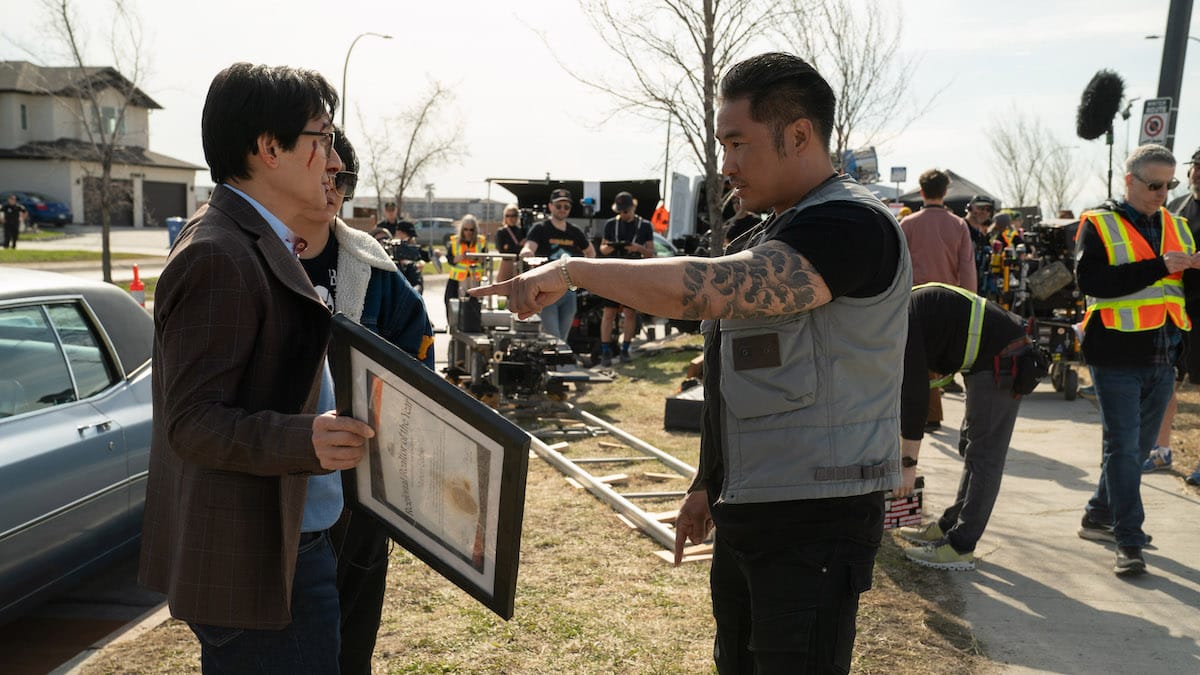
Matthew Macfadyen & Kevin R. McNally on Playing Real People
Jan 19, 2023
Truth really is stranger than fiction — just ask Matthew Macfadyen and Kevin R. McNally, stars of the new Britbox limited series, Stonehouse, based on the wild true story of an MP’s attempts at evading the law. Hailing from A Very British Scandal writer John Preston, the series is a dramatized take on what happens when one man in power attempts to disappear…but isn’t much good at it at all.
Macfadyen stars as John Stonehouse, a member of Parliament who finds himself in the middle of heaping financial trouble after agreeing to spy for the Czech Secret Service, and solves the problem by, what else, faking his death and starting a new life in Australia, away from British politics, as well as his wife (Keeley Hawes) and children. McNally co-stars as Prime Minister Harold Wilson, who leads Parliament by a majority of just one — that one being Stonehouse — and who is desperately trying to keep the situation under control, lest the fabric of his political career come apart at the seams.
COLLIDER VIDEO OF THE DAY
During this interview, the stars discussed balancing research and playing the script when it comes to portraying real people, as well as why the story’s still relevant to a modern audience, and what it was like for Macfadyen to play a couple with his real-life wife Hawes. Check out the full interview in the player above, or read a transcript down below, and be sure to stream Stonehouse, only on Britbox.
COLLIDER: Lovely to meet both of you, it’s such an honor. So excited to talk to you about this show. It was a fantastic experience watching it, even as an American who’s not super familiar with anything to do with British politics, much less the insanity that is this story.
MATTHEW MACFADYEN: We didn’t know anything about it either. Well, I didn’t. Kevin did.
KEVIN MCNALLY: I did. I lived through the story.
Image via Britbox
I was going to ask if you had familiarity with that. I know Matthew, you’ve said you were quite young when it happened.
MACFADYEN: I was born in ’74, which was the year that [John Stonehouse] did the deed, that he flew to Miami and left his clothes on the beach [at] the Shimmering Sands Hotel. So I didn’t know about it. But weirdly, there was a story, there was a book, which was made into a TV show with Leonard Rossiter, called The Fall and Rise of Reginald Perrin, about a man who faked his own death and swam into the seas. And that came after Woods, I think. Is that right?
MCNALLY: I think it was sort of inspired by it, I think.
MACFADYEN: Right. But I didn’t know anything about Stonehouse.
I was curious, in that sense, when you’re playing a real person, because I know you both have done it in the past… obviously some things are dramatized for a television, or film, or whatever. How much research are you doing, and how much are you just relying on what’s on the page?
MACFADYEN: I don’t know. I don’t know whether you’d agree with this, but you do as much research as you fancy really, is the thing, and it depends on the style of thing you are doing. So if it’s a really realistic sort of story, if you’re trying to depict it as accurately as possible, it’s a different type of research I suppose. But there always comes a point, and I haven’t done it very much, but whenever I’m playing a real person, there’s always a point I think, “Right, forget the real, I’ve just got to play the script.” Because you can’t play the research, you can’t play the real events because you have to play the text, you have to play the story you’re shooting. It’s like reading the source novel of a screenplay of a classic. It’s helpful up to a point, but you’re shooting the script and not the novel.
MCNALLY: Yes. I would add to that in that…I would say Stonehouse is actually, or although it’s sort of broad and absurd, and it’s very funny, and it’s a very well told story, it’s actually closer to the true story than many things I’ve ever seen. In particular, I remember it came in for a great deal of criticism, In the Name of the Father, and Tom [Wilkinson]’s role as the defender…the ridiculous story they made up about her looking at park benches and stuff when actually, it was sheer dogged, boring police work that caught the Guildford Four, which was about the IRA bombers. And I’ve seen other shows that are based on true stories that do have some stretches of truth that I think, “Well, why do you need to do that? You might stay with the original story.” And having narrated the complementary documentary, The Real Stonehouse, for this, watch that, and you’ll see that there really aren’t… if anything, we’ve just left a load of stuff out there wasn’t time for. But I don’t see anything invented in it at all.
Yeah, yeah! I did a deep-dive. I read the Wikipedia page on John Stonehouse, and I was shocked at how sort of beat-by-beat everything is. Which is obviously not something you see in “inspired by true story” things.
MCNALLY: No, no, exactly. Yeah.
Image via Britbox
But is there any sort of difference, or is it more difficult to play a real person, do you think, than someone who’s wholly made up for the page, or is it similar in [some] sense?
MACFADYEN: I don’t know. Sometimes you feel a weird sort of responsibility, and sometimes it’s a slightly… I feel a sort of awkward feeling sometimes. But again, there’s a jumping off point [where] you think, “I can’t worry about that. I have to just jump in and hope for the best and trust that the director will tell the story in the right way.” And also, by the time you get to day one of shooting, you’ve got to have faith in the story. A lot of legal work has been done to make sure you’re not giving a false impression of someone’s life story. Because it’s odd, because you’re dealing with people whose relatives are still alive, and all the rest of it. So it’s a strange one sometimes.
MCNALLY: It is a weird hybrid, really.
MACFADYEN: Yeah.
MCNALLY: I felt, and I thought Matthew did really recreate John Stonehouse brilliantly. I felt that a little bit stronger because there’s so much more footage of Harold Wilson, and he’s so much more well known to English people. But fortunately, I had lived through my teenage years with him being Prime Minister, so he was well in there. So I didn’t have to think about it too much, just do the scenes.
Matthew, you worked with your wife, Keeley Hawes, on this, and I know you’ve worked together a couple of times before. But specifically for this project, because the characters are so intertwined, what was that like? Especially because you do get kind of battered by her. She does yell at you many times throughout the course of the couple episodes.
MACFADYEN: Yeah. We just had a really, really great time. We had a really nice time. Apart from anything else, just domestically, it was really nice to hang out. Usually, we’re scattered and trying to keep the plates spinning. But it was really nice to go to work together, sort of see each other.
And you’ve also done Quiz, back in 2020, which is also inspired by this, I guess to use the title [from the writer of this show], but A Very British Scandal. Is there something specifically that draws you to those projects, the based-on-a-true story things, or is it just coincidence?
MACFADYEN: No, just pure good fortune that those scripts came through my door. That was, yeah, just luck.
Image via Britbox
So is there anything particular, for either of you, that draws you to a project, especially something like Stonehouse?
MACFADYEN: I think you know, when you read a script. You think, “This is great.” It’s a visceral feeling of “this is a great story, I could do something with this.” And it’s just in the writing. I sort of tore through John’s script. It’s so brilliantly written. It’s so light and funny, and yet, not sort of surface. It was just a great thing to read.
MCNALLY: I always say that if I can get past page eleven on the first reading, it’s probably got a good chance.
MACFADYEN: Because it’s true. If you read anything… Life’s too short.
MCNALLY: Yeah. You can usually tell within the first ten pages if it’s ready, really. Something might be good, but it might not be ready. It might need a lot more work. Yeah, definitely.
Yeah, that makes sense.
MCNALLY: And I read Stonehouse in one sitting, and then I read it again. Basically, trying to search for scenes that I was in. The hell with them… more of bloody Matthew Macfadyen.
Yeah. Well, I think because this is a period drama, obviously. It’s not set back super far in the past. It’s not 19th century. It’s 1970s, when my parents were alive, obviously, when you guys were alive. So why do you think now is a good time to tell this story?
MACFADYEN: It might as well be like 1870. It’s so different. Just the reality of being able to disappear. It’s inconceivable now. It sort of is a real period piece. Even going back to the ’90s is a period piece. I remember I did something a few years ago and things are changing so rapidly.
I was thinking especially in terms of the idea of evading the truth, evading consequences, that does still strike very heavily today. Do you think thematically, despite the fact that it’s the ’70s and everybody’s in the polyester and in the wigs and everything, that it does still strike pretty true?
MCNALLY: Yeah, because I think the other side of what Matthew’s saying is that people’s interrelationships and what power and success does to people is the same generation to generation, really. I’m just still suffering from the fact that I was doing Chekhov at RADA when he was born. That’s been really bearing on my mind, actually.
MACFADYEN: Sorry. But you’re right, human behavior hasn’t changed whether you’re in a polyester suit, whether you’ve got a mobile and AirPods and/or you’re in britches, on a horse. It’s the same stuff, the same sort of petty vanities and pride and anger and love and all the rest of it.
Image via Britbox
I think that that kind of ties back into my last question for you guys, which is, other than the fact that truth is stranger than fiction, what are you hoping that people will take away from the story?
MACFADYEN: Well, I hope they have a really great time watching it. I think it’s really funny, really interesting. So I hope that they’re royally entertained, and also think a little bit about power and what it does to you.
MCNALLY: Yeah, I would agree totally with Matthew on that. It’s primarily an entertainment, but an entertainment that is leached out of real events and real things that happened.
Stonehouse is available only on Britbox. Check out the trailer below:
Publisher: Source link
16 Women Dating Conservative Men Tell Their Stories
3. "Not only dated but married one. To clarify, he does not own anything with Trump’s name on it. He has a bachelor’s degree in political science, minored in philosophy, spent five years as an enlisted Marine, and is a…
Mar 14, 2025
Martha Stewart’s Farmhouse-Inspired Chair Is $270 Off—Get the Look for Less
Our writers and editors independently determine what we cover and recommend. When you buy through our links, E! may earn a commission. Learn more. You know you’ve made it when your home is so iconic it inspires its own furniture collection—and…
Mar 14, 2025
Ben Affleck On Teaching Kids The Value Of Money
Ben Affleck On Teaching Kids The Value Of Money Ben Affleck is practicing tough love when it comes to keeping his kids grounded. As you probably know, Ben shares three children with his ex-wife, Jennifer Garner, and earlier this month,…
Mar 13, 2025
Lilo & Stitch Live-Action Trailer Is a Hawaiian Roller Coaster Ride
A new generation is about to meet Experiment 626. In the new trailer for Disney’s upcoming Lilo & Stitch live-action remake, the titular characters cross paths after alien experiment Stitch (voiced by Chris Sanders) crash lands on Earth and poses…
Mar 13, 2025











